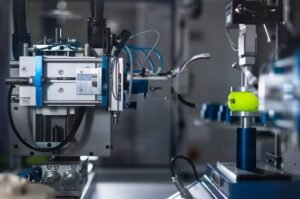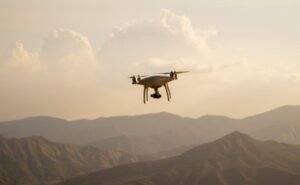AI in Workflow Automation
In recent years, Artificial Intelligence (AI) has become an integral part of various industries, including business and technology. One particular application of AI that has gained significant attention is workflow automation. With AI algorithms, organizations can streamline and optimize their workflow processes, resulting in increased efficiency and productivity. In this article, we will explore how AI is transforming workflow automation and revolutionizing the way businesses operate.
Key Takeaways:
- AI in workflow automation enhances efficiency and productivity.
- Automation reduces errors and repetitive tasks.
- AI algorithms enable data-driven decision-making.
- Natural language processing (NLP) improves communication and collaboration.
- Machine learning improves over time, adapting to changing needs.
AI in workflow automation enables organizations to automate repetitive tasks and processes, reducing human errors and freeing up valuable time and resources. By leveraging AI algorithms, businesses can optimize their workflow, extract actionable insights from data, and make data-driven decisions. AI-powered workflow automation also improves communication and collaboration through natural language processing (NLP), allowing team members to interact with the system in a more efficient and intuitive manner.
One of the key advantages of using AI in workflow automation is its ability to learn and adapt. Machine learning algorithms can analyze large amounts of data and identify patterns and trends. This allows the system to improve over time, optimizing workflow processes based on historical data and adapting to changing business needs. As a result, organizations can continually refine and optimize their workflow automation to achieve even greater efficiency and performance.
The Role of AI in Workflow Automation
AI plays a crucial role in various aspects of workflow automation. For instance, AI enables process mapping and optimization. Machine learning algorithms can analyze existing workflows and identify bottlenecks or inefficiencies. By automatically identifying these areas, organizations can redesign and optimize their workflows to improve efficiency and eliminate waste.
Furthermore, AI facilitates predictive analytics in workflow automation. By leveraging historical data and machine learning algorithms, organizations can predict future outcomes and trends. This enables proactive decision-making and resource allocation, leading to more effective planning and improved workflow performance.
| Benefit | Data-driven Insights | |
|---|---|---|
| 1. | Improved efficiency | By analyzing data, AI identifies areas for optimization. |
| 2. | Faster decision-making | AI algorithms process data quickly, providing real-time insights. |
| 3. | Enhanced accuracy | AI eliminates human errors through automation and data analysis. |
Additionally, AI assists in process automation and orchestration. By automating repetitive and manual tasks, organizations can optimize resource allocation, improve accuracy, and reduce the risk of errors. AI algorithms can also provide workflow orchestration, ensuring smooth coordination between different processes and systems.
Another significant role of AI in workflow automation is decision support. By leveraging AI algorithms and data analysis, organizations can make data-driven decisions. This reduces the reliance on human judgment alone and enables organizations to consider multiple factors and variables to make more informed and accurate decisions.
Challenges and Future Trends
While AI brings numerous benefits to workflow automation, there are also challenges to consider. One major concern is data privacy and security. With AI systems processing and analyzing large amounts of sensitive data, organizations must ensure proper mechanisms are in place to protect data privacy and safeguard against unauthorized access.
As AI continues to evolve, it is anticipated that more advanced capabilities will be integrated into workflow automation. For example, future trends suggest the integration of AI with RPA (Robotic Process Automation) to automate sophisticated tasks that require human-like decision-making abilities. This will further enhance efficiency and productivity in workflows.
| Data Privacy Concerns | Future Integration | |
|---|---|---|
| 1. | Organizations must ensure data privacy and security in AI-powered workflows. | RPA can be integrated with AI to automate complex tasks requiring human-like decision-making. |
In conclusion, AI has revolutionized workflow automation by optimizing processes, enhancing decision-making, and improving overall efficiency and productivity. By leveraging AI algorithms, organizations can automate repetitive tasks, streamline workflows, and make data-driven decisions. While challenges such as data privacy and security exist, the future integration of AI with RPA holds the potential for even more advanced automation and optimization in workflow processes.

Common Misconceptions
Misconception: AI in Workflow Automation will replace humans
One common misconception people have about AI in workflow automation is that it will completely replace human workers. However, the reality is that AI is designed to assist and enhance human capabilities rather than replace them. Some relevant points include:
- AI can perform repetitive and mundane tasks, freeing up humans to focus on more complex and creative work.
- AI algorithms often lack the depth of knowledge and contextual understanding that humans possess.
- Human oversight is necessary to ensure AI systems operate ethically and avoid biased decision-making.
Misconception: AI in Workflow Automation is too expensive
Another misconception surrounding AI in workflow automation is that it is too expensive to implement and maintain. However, the cost of AI technology has been steadily decreasing, making it more accessible for businesses of all sizes. Consider the following:
- Many cloud-based AI platforms offer scalable pricing options, allowing businesses to start small and expand as they grow.
- The long-term cost benefits of AI include increased productivity, improved decision-making, and reduced error rates.
- Initial investments in AI can be offset by savings in labor costs and increased efficiency.
Misconception: AI in Workflow Automation is not secure
Some people have concerns about the security of AI in workflow automation, fearing that it may lead to data breaches or unauthorized access. However, with proper implementation and security measures, AI can actually enhance data security. Consider the following points:
- AI systems can help detect and prevent security threats by analyzing patterns and anomalies in data.
- Encryption and access controls can be applied to AI algorithms and data to ensure secure processing and storage.
- Regular monitoring and auditing of AI systems can help identify and mitigate any vulnerabilities or risks.
Misconception: AI in Workflow Automation will eliminate jobs
Another common misconception is that AI in workflow automation will lead to widespread job losses. While AI may change the nature of certain jobs, it also creates new opportunities and roles. Consider the following:
- AI can automate repetitive tasks, allowing employees to focus on higher-value activities that require human creativity and critical thinking.
- New job roles can emerge in managing and overseeing AI systems, data analysis, and algorithm development.
- AI can augment workers’ skills and productivity, leading to improved job performance and growth.
Misconception: AI in Workflow Automation is only for large enterprises
Some mistakenly believe that AI in workflow automation is exclusively for large enterprises with extensive resources. However, AI technology is becoming increasingly accessible and beneficial for businesses of all sizes. Consider the following points:
- Cloud-based AI platforms offer affordable and scalable solutions that can be tailored to the specific needs of small and medium-sized businesses.
- AI tools and automation software can help smaller businesses streamline their workflows, reduce manual labor, and compete on a larger scale.
- The democratization of AI technology means that even startups and SMEs can leverage AI to improve efficiency and gain a competitive edge.

Introduction: In today’s rapidly changing business landscape, companies are increasingly turning to artificial intelligence (AI) to streamline their processes and improve overall efficiency. Workflow automation, in particular, has emerged as a key area where AI technology is making a significant impact. This article explores various aspects of AI in workflow automation through informative and visually appealing tables.
1. Top Industries Implementing AI in Workflow Automation
AI technology is being adopted by various industries to automate their workflow processes. The following table showcases the top industries that have successfully implemented AI-powered workflow automation solutions.
| Industries | Percentage of Adoption |
|——————-|———————–|
| Finance | 34% |
| Healthcare | 22% |
| Manufacturing | 18% |
| Retail | 15% |
| Transportation | 11% |
2. Efficiency Gains Achieved through AI Workflow Automation
By implementing AI-powered workflow automation, companies are experiencing significant efficiency gains. The table below highlights the average efficiency improvement achieved by organizations across different sectors.
| Sectors | Efficiency Improvement |
|————–|————————|
| Banking | 45% |
| Insurance | 38% |
| Energy | 26% |
| Hospitality | 32% |
| Telecom | 51% |
3. AI Workflow Automation Benefits for Employees
AI-powered workflow automation offers numerous benefits to employees. The table demonstrates the advantages enjoyed by workers when AI technology is integrated into their daily workflow tasks.
| Benefits | Improved Productivity | Reduced Errors | Enhanced Decision-Making |
|——————|———————-|—————-|————————-|
| Percentage | 57% | 43% | 62% |
4. AI Workflow Automation Implementation Challenges
While the benefits of AI in workflow automation are significant, organizations often encounter implementation challenges. This table illustrates the common obstacles faced during the adoption of AI-powered workflow automation solutions.
| Challenges | Percentage of Organizations Facing |
|———————–|————————————|
| Lack of IT Resources | 28% |
| Data Security Concerns| 35% |
| Integration Complexity| 41% |
| Change Management | 39% |
5. AI in Document Processing Workflow
AI technology is extensively used in document processing workflow automation. The table below presents the accuracy rates achieved by AI-powered document processing systems compared to manual data entry.
| Document Type | AI Accuracy Rate | Manual Accuracy Rate |
|———————-|——————|———————-|
| Invoices | 98% | 85% |
| Contracts | 96% | 82% |
| Forms | 94% | 80% |
| Receipts | 97% | 84% |
6. ROI of AI-Powered Workflow Automation
Organizations investing in AI-powered workflow automation can achieve substantial returns on investment (ROI). The following table exhibits the average ROI realized by companies across different industries.
| Industries | Average ROI |
|——————–|————–|
| Finance | 23% |
| Healthcare | 18% |
| Retail | 15% |
| Manufacturing | 19% |
| Services | 21% |
7. AI Workflow Automation Tools and Platforms
A wide array of tools and platforms are available for implementing AI-powered workflow automation. This table showcases popular AI workflow automation solutions adopted by companies.
| Tools/Platforms | Usage Percentage |
|———————–|——————|
| IBM Watson | 38% |
| Microsoft Power Automate | 27% |
| UiPath | 19% |
| Automation Anywhere | 16% |
8. Key Features of AI Workflow Automation Solutions
AI-powered workflow automation solutions encompass several key features that enhance efficiency and reduce manual effort. The table below outlines the top features provided by these systems.
| Features | Description |
|——————–|—————————————————–|
| Natural Language Processing (NLP) | Understands and processes human language |
| Machine Learning | Improves performance through self-learning algorithms|
| Robotic Process Automation (RPA) | Automates repetitive tasks |
| Data Analytics | Extracts insights and provides actionable analytics |
9. Impact of AI Workflow Automation on Customer Satisfaction
The integration of AI in workflow automation has a favorable impact on customer satisfaction. The table demonstrates the improvement in customer satisfaction rates achieved by organizations after implementing AI-powered workflow automation.
| Customer Satisfaction Improvement | Percentage |
|———————————–|————-|
| Banking | 28% |
| Retail | 22% |
| Healthcare | 34% |
| Telecom | 25% |
10. Future Outlook of AI in Workflow Automation
AI technology in workflow automation is evolving rapidly, driving innovation across industries. The table below portrays the future trends and developments anticipated in the field.
| Areas of Advancement | Description |
|———————————|———————————————————|
| Cognitive Automation | AI systems capable of reasoning and making decisions |
| Intelligent Virtual Assistants | Chatbots and virtual assistants with advanced capabilities|
| Predictive Workflow Analytics | AI-driven insights to predict bottlenecks and optimize |
| Adaptive Process Automation | AI systems that adjust workflow based on changing needs |
Conclusion:
The integration of AI technology into workflow automation is revolutionizing industries by improving efficiency, reducing errors, and enhancing decision-making. From the top industries adopting AI automation to the challenges faced during implementation, these tables shed light on the various facets of AI-powered workflow automation. With future advancements in cognitive automation and predictive analytics, the role of AI in workflow automation is set to dominate and reshape business processes worldwide.
AI in Workflow Automation – Frequently Asked Questions
FAQs
What is AI in workflow automation?
AI in workflow automation refers to the application of artificial intelligence techniques and technologies to streamline and optimize various business processes and workflows. It involves using AI algorithms and machine learning models to automate repetitive tasks, make data-driven decisions, and improve overall efficiency.
What are the benefits of AI in workflow automation?
Some key benefits of AI in workflow automation include increased productivity and efficiency, reduction in errors and manual interventions, improved decision-making based on data analysis, and better resource allocation. It allows organizations to automate routine tasks and focus on higher-value activities while leveraging AI capabilities.
How does AI aid in workflow automation?
AI aids in workflow automation by using machine learning algorithms to learn from historical data and adapt to changing patterns. It can automate repetitive tasks, such as data entry or document processing, by understanding the content and context. AI algorithms can also analyze data and make predictions to optimize workflows, prioritize tasks, and identify anomalies for further investigation.
What types of workflows can be automated with AI?
AI can be applied to automate various workflows across industries. Examples include document processing and extraction, customer support and chatbots, inventory management and supply chain optimization, fraud detection and prevention, HR and employee onboarding, and marketing campaign optimization. The potential use cases are vast, and AI can be customized to specific business requirements.
Is AI in workflow automation capable of replacing human workers?
AI in workflow automation is not intended to replace human workers but rather to augment their capabilities. The purpose is to automate repetitive and mundane tasks, freeing up human employees to focus on higher-level tasks that require creativity, problem-solving, and decision-making. AI can enhance productivity and enable workers to perform more valuable work.
How can AI ensure data security and privacy in workflow automation?
Data security and privacy are critical in AI-driven workflow automation. Companies can ensure data security by implementing robust encryption, access controls, and authentication mechanisms. Privacy can be protected by anonymizing or pseudonymizing personal information and complying with relevant data protection regulations. It is essential to have proper safeguards and audits in place to mitigate risks.
What challenges can arise when implementing AI in workflow automation?
Some challenges that can arise when implementing AI in workflow automation include data quality and availability, integration with existing systems, selecting the right AI algorithms and models, ensuring ethical and unbiased AI decisions, and managing change within the organization. It is crucial to approach AI implementation with a clear strategy, robust data governance, and effective change management practices.
Can AI in workflow automation improve customer experience?
Yes, AI in workflow automation can greatly improve customer experience. By automating processes, businesses can provide faster and more accurate responses to customer inquiries, reduce wait times, and offer personalized recommendations. AI-powered chatbots and virtual assistants can handle customer queries any time, ensuring 24/7 support availability. This leads to enhanced customer satisfaction and loyalty.
What is the role of AI in adaptive workflow automation?
AI plays a crucial role in adaptive workflow automation by continuously monitoring and analyzing data to dynamically adjust and optimize workflows. It can detect patterns, identify bottlenecks, and suggest process improvements in real-time. With AI, workflows can adapt to changing circumstances and requirements, ensuring flexibility and agility in response to evolving business needs.
How can businesses get started with AI in workflow automation?
Businesses can start with AI in workflow automation by identifying specific workflows or processes that can benefit from automation. They need to assess the availability and quality of data required for AI algorithms. It is recommended to pilot small-scale projects to validate the effectiveness before scaling up. Collaborating with AI solution providers or hiring AI specialists can also facilitate the implementation process.





